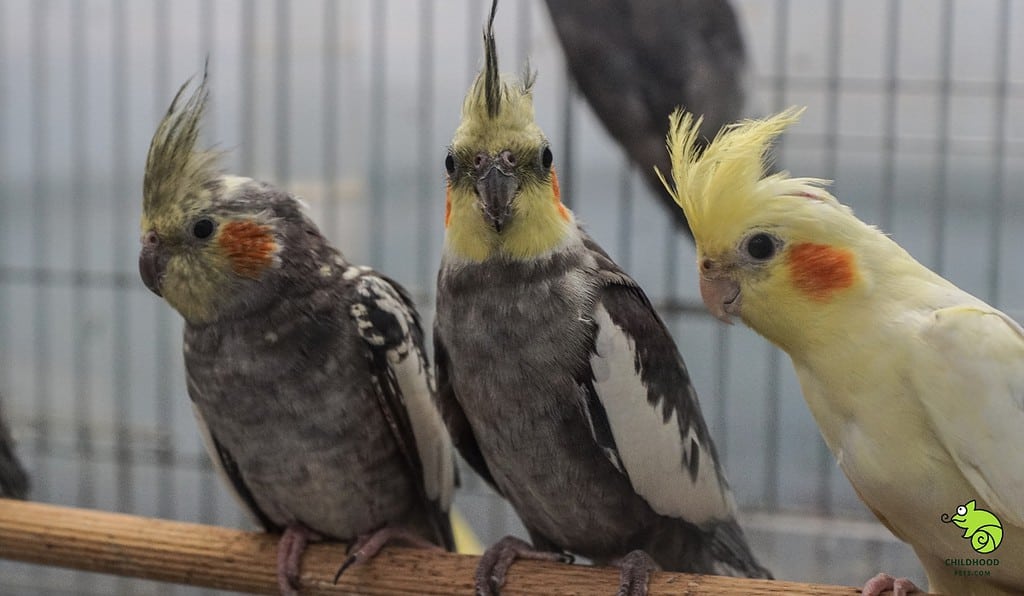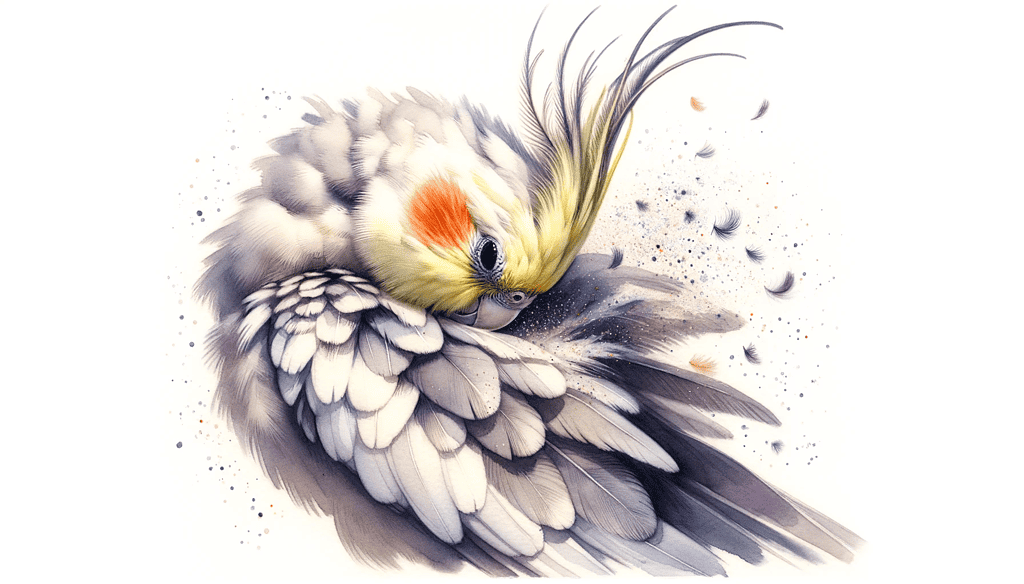
Cockatiels, with their vibrant crests and melodious chirps, have become a favorite among bird enthusiasts worldwide. But beyond their captivating appearance and behavior lies a unique characteristic that often surprises many: their dusty nature. Have you ever wondered why these charming birds seem to leave a powdery residue wherever they perch?
On Average, cockatiels are among the dustiest of small bird species due to their unique powder-down feathers and the natural process of keratin flaking off. This dust plays a vital role in their feather health, acting as a protective barrier against contaminants.
Explore the world of cockatiels from a vet’s perspective, shedding light on their dusty nature, its implications, and how to manage it effectively. Stay with us for a feathery journey you won’t want to miss!
Why Are Cockatiels So Dusty?
Cockatiels are naturally dusty due to their unique powder-down feathers. These feathers continuously grow and disintegrate into a fine powder, which the bird spreads over its body during preening. This powder acts as a protective barrier, helping to keep the feathers clean and free from external contaminants. Additionally, the natural process of keratin flaking off from their feathers contributes to the dustiness. While this dust serves essential functions for the bird, such as waterproofing and protection, it’s often noticeable in their living environment.
Natural Causes of Dustiness in Cockatiels
Cockatiels, like many other birds, have a natural dustiness to their feathers. But what causes this dustiness?
Physical Characteristics of Cockatiel Feathers
Cockatiel feathers are unique in their structure. Each feather is covered in a fine layer of powder, which is actually made up of tiny particles from the feather itself. This powder serves as a protective layer, helping to keep the feather clean and free from external contaminants.
Cockatiel Grooming Habits
If you’ve ever watched a cockatiel preen, you’ll notice they spend a significant amount of time grooming their feathers. As they do this, they’re not only aligning their feathers but also distributing this protective powder. This grooming process naturally releases some of this powder, contributing to the dust you might notice around their cage or play area.
Reasons for Excessive Dust in Cockatiels

Before we dive into the specific reasons for excessive dust in cockatiels, it’s essential to understand that while some dust is natural, an excessive amount can indicate underlying issues.
1. Molting
Molting is a natural process where birds shed old feathers and grow new ones. During this time, cockatiels will produce more dust than usual. This is because the new feathers, as they emerge, are covered in a protective sheath that eventually turns to dust as the feather matures.
2. Improper Care
Regular baths are crucial for cockatiels. In the wild, these birds would have access to water sources for bathing. Without regular baths, the dust can accumulate on their feathers, leading to increased dustiness.
3. Untidy Cage
A clean environment is essential for any pet, and cockatiels are no exception. An untidy cage can contribute to increased dust levels. Regular cleaning, including changing the cage lining and wiping down surfaces, can help manage dust levels.
4. Problems with Space
Overcrowding can lead to increased dust. More birds in a confined space mean more feathers and, consequently, more dust. It’s essential to provide adequate space for your cockatiels to ensure their comfort and well-being.
5. Hot Weather
Heat can lead to increased dust production in cockatiels. In hot weather, cockatiels produce more powder down, a type of feather that disintegrates into a fine powder, to help regulate their body temperature.
How Cockatiel Dust Can Be Harmful?
Understanding the implications of cockatiel dust is crucial for both the bird’s health and the well-being of those around them. Let’s delve into the potential harms of this dust.
1. Impact on Human Health
While cockatiel dust is non-toxic, it can pose respiratory challenges for some individuals. Breathing in this fine dust over prolonged periods can lead to respiratory issues, especially for those with pre-existing conditions. Some people might also develop allergies to bird dust. In rare cases, prolonged exposure can lead to a condition called hypersensitivity pneumonitis, an allergic reaction to inhaled particles.
2. Impact on Cockatiels
Excessive dust isn’t just a concern for humans. For cockatiels, an overly dusty environment can lead to respiratory problems. Their airways are much smaller, making them more susceptible to blockages from dust. Moreover, a clean environment is paramount for their overall health. Excessive dust can also coat their feathers, reducing their natural waterproofing and insulation properties.
Tips to Reduce Cockatiel Dust
For those of you who adore your feathery friends but are struggling with the dust, here are some actionable tips:
- Bathe Your Cockatiel Regularly: Just like us, cockatiels benefit from regular baths. It helps reduce the amount of dust and keeps their feathers in top condition.
- Invest in an Air Purifier: An air purifier, especially one with a HEPA filter, can effectively reduce the amount of airborne dust.
- Wipe Down Surfaces Daily: Regularly wiping down surfaces in and around the bird’s area can prevent dust accumulation.
- Vacuum Daily: A daily vacuum routine, especially around the bird’s cage, can significantly reduce dust levels.
- Keep Windows and Doors Closed: This prevents additional outdoor dust from entering and mixing with the cockatiel’s natural dust.
- Mist the Cage Liner Before Replacing It: This helps in settling the dust and prevents it from becoming airborne.
- Keep the Room Well Ventilated: Proper ventilation ensures that dust doesn’t settle and remains airborne, making it easier to remove.
Role of Dust in Maintaining Feather Health
While the dust might seem like a nuisance, it plays a vital role in a cockatiel’s health. The dust acts as a protective barrier, shielding the feathers from dirt, moisture, and other potential contaminants. It also helps in waterproofing their feathers, ensuring they remain dry even in damp conditions.
Moreover, the dust has antimicrobial properties, which can help protect cockatiels from skin and feather infections. So, the next time you notice a little dust around your cockatiel’s cage, remember it’s all part of their natural self-care routine.
Conclusion
In our exploration of the dusty nature of cockatiels, we’ve uncovered the unique characteristics that make these birds both fascinating and a tad challenging for potential owners. Their dustiness, rooted in their biology, serves essential functions for their well-being. With the right knowledge and tools, you can ensure a healthy and comfortable environment for your feathered friend.
Did you find this insight into cockatiels enlightening? We’d love to hear your thoughts in the comments below. If this article resonated with you, please consider sharing it with fellow bird enthusiasts. Your feedback is invaluable to us!
Frequently Asked Questions
How often should I bathe my cockatiel to reduce dust?
It’s beneficial to offer your cockatiel a bath or misting at least once a week.
How can I ensure my home remains clean with a cockatiel?
Regular cleaning, vacuuming, and using air purifiers can help maintain a clean environment.
Are wild cockatiels also dusty?
Yes, wild cockatiels produce dust just like their domestic counterparts. However, their natural environment and behaviors help manage dust levels.
